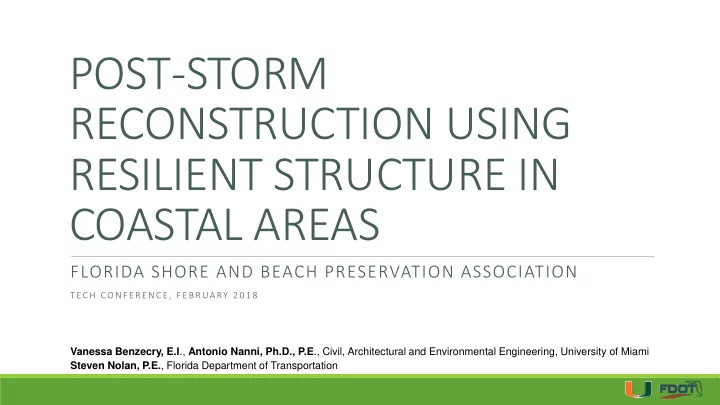

POST-STORM RECONSTRUCTION USING RESILIENT STRUCTURE IN COASTAL AREAS FLORIDA SHORE AND BEACH PRESERVATION ASSOCIATION T EC H C O N F E R E N C E , F E B R UA RY 2 0 1 8 Vanessa Benzecry, E.I ., Antonio Nanni, Ph.D., P.E ., Civil, Architectural and Environmental Engineering, University of Miami Steven Nolan, P.E. , Florida Department of Transportation
71% of Earth’s Surface is Water • Urban development near the water is inevitable • Water is an important factor in the development of communities • Populations in coastal zones continue to increase VANESSA BENZECRY, E.I., UNIVERSITY OF MIAMI
Population Increase Percentage Increase in Coastal and Non-coastal Coastal Population Growth between 1980 and 2003 Population by Time Period Source: U.S. Census Bureau VANESSA BENZECRY, E.I., UNIVERSITY OF MIAMI
Coastal Structures are Vulnerable • Located in highly aggressive environment • Exposed to hazards • Non-resilient • Low durability • At risk Downtown Miami during Hurricane Irma Source: USA Today VANESSA BENZECRY, E.I., UNIVERSITY OF MIAMI
Hurricanes and their Damages Coastline Counties Most Frequently Hit By Hurricanes National Damages from Hurricanes and Storms Source: NHC NOAA from 1960 to 2008 Source: U.S. Census Bureau VANESSA BENZECRY, E.I., UNIVERSITY OF MIAMI
Damages from Hurricane Irma Collapsed Seawall due to Hurricane Irma in Punta Gorda, FL. Dock Damaged by Hurricane Irma in Islamorada, FL. Source Thestar.com Source NBC2 News VANESSA BENZECRY, E.I., UNIVERSITY OF MIAMI
Corrosion • Failure mechanism for structures exposed to aggressive environments is often corrosion of steel reinforcement • Chlorides from seawater penetrate concrete and reach steel • Through cracks • Through concrete porosity • Corrosion is accelerated by carbonation of concrete that lowers the pH Bridge Piling with Damage Caused by Reinforcement Corrosion. Picture from NACE international VANESSA BENZECRY, E.I., UNIVERSITY OF MIAMI
Corrosion Miami Marine Stadium, beam with spall and Bulkhead cap with reinforcement corrosion. Picture from Duoguard. corroded reinforcement . VANESSA BENZECRY, E.I., UNIVERSITY OF MIAMI
Current Mitigation Methods Traditional corrosion mitigation efforts focus on keeping chlorides from getting to the reinforcing steel or simply delaying the time • Admixtures • Increase Concrete Cover • Alter Concrete Mix • Membranes & Overlays • Epoxy coated or Stainless Steel • Cathodic Protection Cathodic Protection Source: CLR Concrete Repairs Limited Stainless Steel Rebars VANESSA BENZECRY, E.I., UNIVERSITY OF MIAMI
Engineer’s Responsibilities • Problem solving • Meet societal needs • Safety and welfare of the public • Minimize environmental impacts VANESSA BENZECRY, E.I., UNIVERSITY OF MIAMI
Creating a Resilient Structure Before Hurricane Irma After Hurricane Irma – Current Conditions VANESSA BENZECRY, E.I., UNIVERSITY OF MIAMI
I-Dock: A Resilient Coastal Structure • A post-hurricane reconstruction project • Designed to resist category 4 hurricanes • Use of SEACRETE™ and SEABAR™ Seacrete™: Sustainable concrete using seawater, salt-contaminated aggregates, and non-corrosive reinforcement VANESSA BENZECRY, E.I., UNIVERSITY OF MIAMI
Seabar™ SEABAR™: non-corrosive reinforcement with superior performance in chloride-contaminated environments SEABAR™ includes Glass Fiber Reinforced Polymers (GFRP), Carbon Fiber Reinforced Polymers (CFRP) and Basalt Fiber Reinforced Polymers (BFRP) bars. VANESSA BENZECRY, E.I., UNIVERSITY OF MIAMI
Seabar™ Advantages • Non-corrosive • High strength-to-weight ratio • Ease of application & installation • ¼ the weight of steel • Transparent to magnetic fields and radar frequencies • Electrically and thermally non- conductive Construction Crew Lifting Reinforcement Cage. Source: University of Miami VANESSA BENZECRY, E.I., UNIVERSITY OF MIAMI
Seabar™ Disadvantages • No ductility • Lower modulus than steel • No ability to bend at site • High CTE perpendicular to fibers • Lack of familiarity among engineers and contractors Source: University of Miami VANESSA BENZECRY, E.I., UNIVERSITY OF MIAMI
Design and Constructability VANESSA BENZECRY, E.I., UNIVERSITY OF MIAMI
Final Product Look Panama City Beach Pier Picture from Steven Nolan . Dinner Key Marina in Miami, FL Source: GEF Innovative Solutions in Fiberglass Miamarina, Miami FL VANESSA BENZECRY, E.I., UNIVERSITY OF MIAMI
I-Dock Advantages • Coastal structure that can withstand hurricane wind and wave forces • Smart use of natural resources: seawater • High durability: life expectancy 75+ years • More tolerant habitat for marine life Seacrete™ specimens VANESSA BENZECRY, E.I., UNIVERSITY OF MIAMI
Other Applications Any coastal structure: • Seawalls • Bulkhead caps • Docks • Marinas • Breakwater • Bridges FDOT Bridge Substructure Rehabilitation Source:FDOT VANESSA BENZECRY, E.I., UNIVERSITY OF MIAMI
Projects with FRP Reinforcement FDOT Bulkhead Rehabilitation Project. GFRP Used in Concrete Cap and Fascia Panels Source: FDOT FDOT Bridge Rehabilitation project. GFRP and CFRP Used in Concrete Deck Source: University of Miami VANESSA BENZECRY, E.I., UNIVERSITY OF MIAMI
Conclusion • Eliminates the issue of corrosion in reinforced concrete • Smart use of natural resources • Light-weight reinforcement and smaller cross section: facilitate transportation and construction • Resilient coastal structure • Less harmful to the environment • Cost-effective: long- term investment VANESSA BENZECRY, E.I., UNIVERSITY OF MIAMI
Questions? Thank you! VANESSA BENZECRY, E.I., UNIVERSITY OF MIAMI
Recommend
More recommend